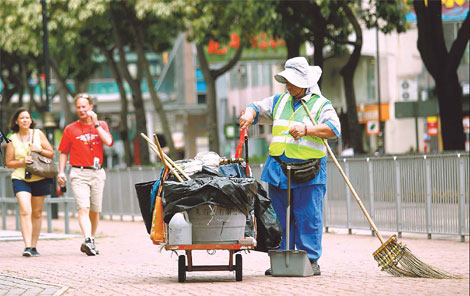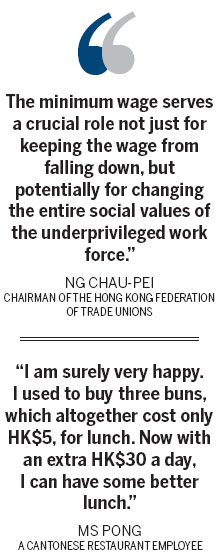Economy
Minimum wage may not pay off for some
Updated: 2011-05-25 13:54
By Andrea Deng (China Daily)
|
 The beneficiaries of the minimum wage ordinance in Hong Kong are mainly security guards, catering workers and cleaners, who usually earn HK$4,000 to HK$6,000 a month. [Photo / China Daily] |
Job fears grow as employers struggle with new rate, Andrea Deng reports from Hong Kong.
John is 75, a wiry wisp of a fellow. Despite a slouch, he works 12-hour nightshifts as a security guard in Sham Shui Po, Kowloon. He has been doing it day in, day out, for 15 years.
He gets HK$4,200 ($540) a month, provided he does not take holidays or days off. All his salary goes to pay for medical care and expenses for his wife, who lives in Shenzhen and has breast cancer.
Sometimes John takes a day off. He pays somebody to fill in so he can cross the border and spend the day taking care of his wife.
|
||||
John's wages work out to about HK$13 an hour. But on May 1 the Hong Kong Special Administrative Region introduced a minimum wage of HK$28 per hour.
John's monthly income should have shot up to more than HK$10,000. It didn't.
"My employer told me, without any vagueness, that he simply cannot afford HK$28," said John, who insisted on anonymity and declined to give even a vague location of the building where he works. He was afraid he might be fired if the property management company finds out he talked to a reporter.
"I am 75 years old. I have no bargaining chip whatsoever. And I don't want to take the risk and take a toll on my wife."
What might happen
|
|
Perhaps John fell into the worst-case scenario pertaining to the wage ordinance, which was intended to prevent workers from being exploited by unscrupulous employers.
Many in the work force will see their wages shoot up, in some cases by several thousand dollars a month. Some will be sacked by companies that cannot afford the minimum wage or refuse to pay it. Some local small and medium-size enterprises will be unable to afford the increased costs and will wrap up operations. The rest of the city's hourly workers will see their raises offset by withdrawal of previously paid benefits.
The Provisional Minimum Wage Commission, which was appointed to advise the city's chief executive on the amount of the minimum wage, estimated in 2010 that some 274,000 employees would benefit from the ordinance.
It also estimated that about 40,000 people could lose their jobs if they worked for marginally profitable companies operating on the edge. About 1,700 enterprises were expected to fall from marginal profit into red ink.
"We knew that the least productive employees would risk being sacked because of the minimum wage, but that cannot dilute the fact that a larger number of employees will see their insulting wages being increased," said Ng Chau-pei, chairman of the Hong Kong Federation of Trade Unions.
The beneficiaries, Ng said, are mainly security guards, catering workers and cleaners, who usually earn HK$4,000 to HK$6,000 a month working more than 10 hours a day. Their occupations are widely considered to be the lowest-paying.
Ms Pong, an immigrant in her 40s who would not give her full name, works 10-hour days at one of Yau Ma Tei's most popular alfresco Cantonese restaurants. Her pay is going from HK$25 an hour to HK$28.
"I am surely very happy. I used to buy three buns, which altogether cost only HK$5, for lunch. Now with an extra HK$30 a day, I can have some better lunch." She giggled as she sat in front of piled-up dishes containing food remnants in a dark alley behind Temple Street.
The ordinance has even drawn some retirees back to the work force. Lee Tak-cheung, 65, is a night shift security worker at a residential building in Pak Kung Street, To Kwa Wan, one of Hong Kong's oldest districts and a place where seedy private tenement buildings abound.
He said he had been retired for a few years and started working again on May 1, the day the ordinance took effect. The salary stated in the contract is HK$8,000, compared with a previous offer of HK$5,000.
Specials

Suzhou: Heaven on Earth
Time-tested adages sing praises of Suzhou, and Michael Paul Franklin finds it's not hard to understand why on a recent visit.

The sky's the limit
Chinese airline companies are increasingly recruiting pilots and flight attendants as the industry experiences rapid expansion.

Diving into history
China's richest cultural heritage may lie in the deep, like exhibits in a giant underwater museum.




